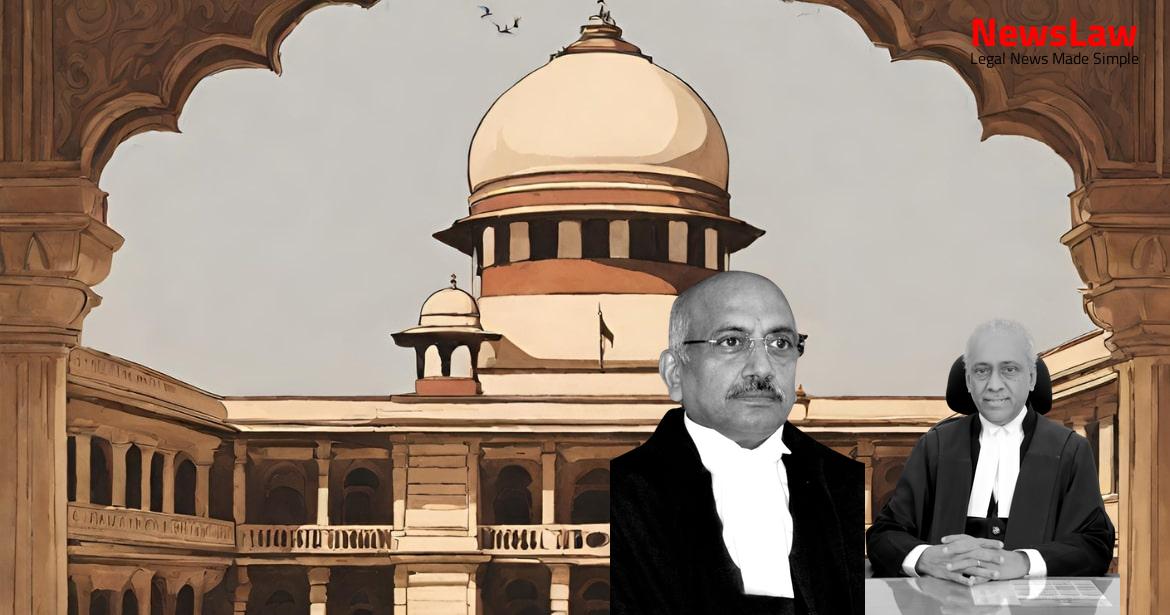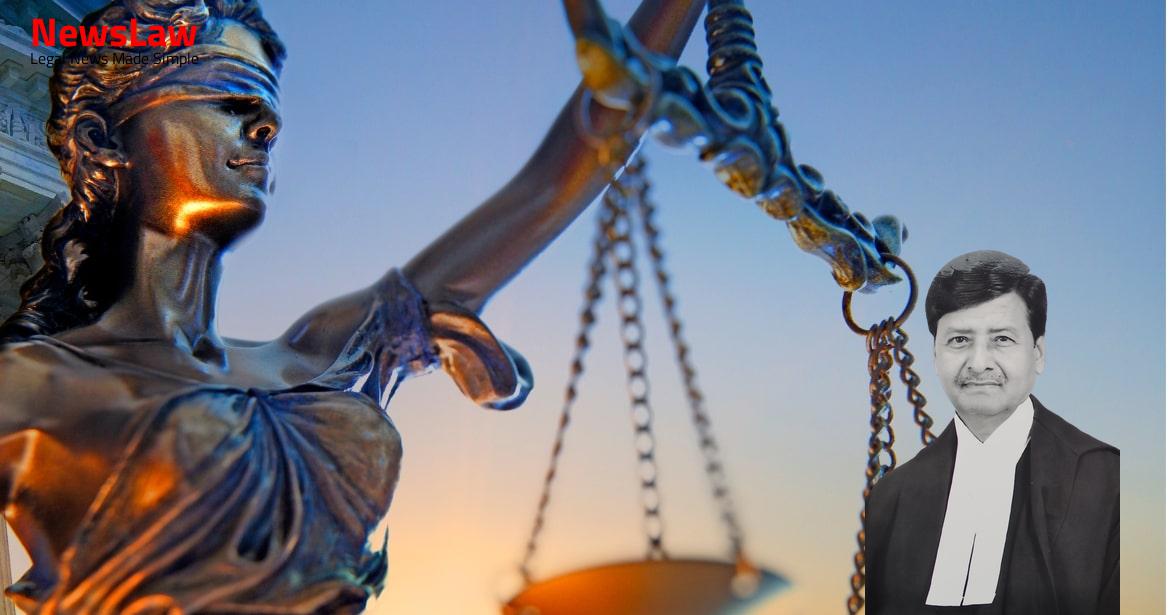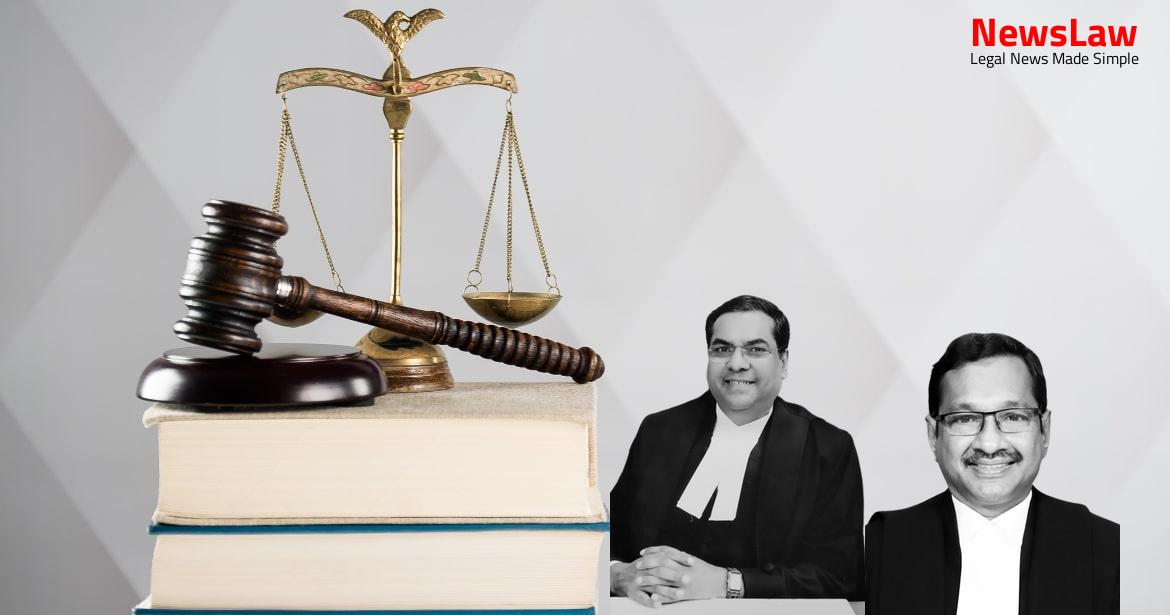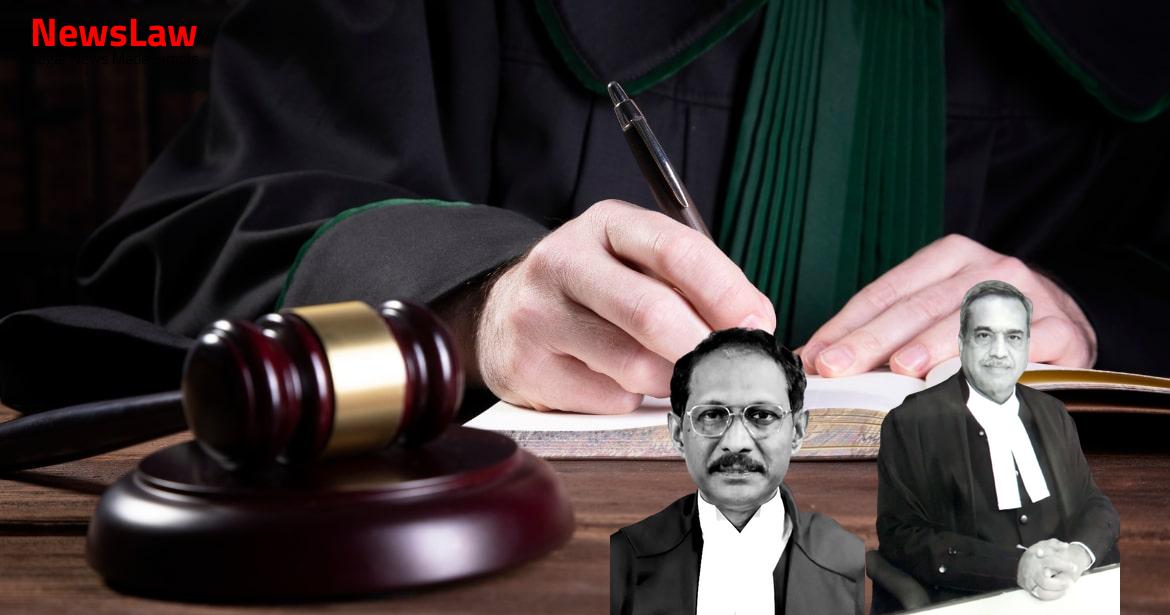Explore a detailed legal analysis on settlement claims in a recent money suit case where the court delved into the intricate details of burden of proof and obligations in non-gratuitous acts. The court’s evaluation of claims and counterclaims provides insights into the complexities of establishing settlements and entitlements in legal disputes.
Facts
- Appellant filed two suits against respondents for recovery of Rs. 10,48,000 and Rs. 67,31,000 respectively.
- Averments in the first suit included a business dealing in building materials under a specific name and style, with claims of borrowed money and investments in real estate.
- Respondents claimed they never borrowed any money, returned part of the alleged amount, and made payments towards investments.
- Appellant’s son admitted in an affidavit that part of the payments was out of love and affection.
- Respondents argued that the complaint of forgery was false and that the bank should have been impleaded in the suit.
- Respondents stated no money was due to the appellant.
- In the second suit, appellant alleged unauthorized withdrawals and forgery by respondents in accessing her bank account.
- Respondents contended they were involved in a joint real estate business with the appellant since 2001-2002, buying and selling properties together.
- Appellant and her family kept substantial funds in a joint bank account with the respondents for use in real estate dealings.
- A cheque signed by the third respondent with forged signature of the appellant was encashed, leading to the discovery of unauthorized transactions.
- Appellant filed a criminal complaint against respondents for offenses under the Indian Penal Code.
- Trial witnesses included the appellant, her husband, and the respondents themselves, with contradictory statements and claims between the parties.
- The trial Court dismissed the first suit due to failure in establishing the loan advancement and not examining the appellant’s son as a witness.
- The trial Court also mentioned that the suit was not within the period of limitation.
- The second suit was dismissed by the trial Court on the grounds of parties being in real estate business and payment in full settlement proven by third party mediators.
- The appellant failed to establish fraud by the respondents in the second suit according to the trial Court.
- The district Judge allowed the first appeals granting decrees for recovery of specific amounts with interest percentages in both suits.
- The High Court allowed the second appeals resulting in the dismissal of the money suits filed by the appellant.
- The High Court further directed the appellant to refund the amount paid by the respondents with a specific interest percentage.
Also Read: Analysis of Possession and Ownership Rights
Arguments
- The contention of the Shri Rajiv Bhalla, learned counsel for the appellant is that the trial Court and the High Court erred in accepting the plea of full and final settlement put forth by the respondents.
- It is argued that the High Court exceeded its authority by ordering a refund of money paid during the proceedings for anticipatory bail.
- Failure of the appellant to implead her son as a co-plaintiff or to examine him as a witness was a significant contention by the respondent.
- The respondent’s argument was supported by the appellant’s own admissions as PW-2, which contradicted her case.
- Authorized payments to the respondents and a settlement established through third party mediators led to the failure of the appellant-plaintiff’s case.
- The judgment of the High Court was deemed not in need of interference based on these factors.
Also Read: Analysis of Representative Complaints in Consumer Protection Cases
Analysis
- The affidavit filed by the respondents on 8.03.2006 admitted receiving Rs.30,00,000 from the appellant-plaintiff out of love and affection.
- The defendants claimed that there was no transaction between them and the deponents.
- The defendants failed to provide any written evidence of the Rs.5,00,000 payment on 7.08.2006 being a full and final settlement.
- The onus fell on the defendants to prove the settlement, which they did not do.
- The affidavit filed by the respondents contradicted their claim of a full and final settlement on 7.08.2006.
- The courts overlooked the lack of evidence supporting the settlement claimed by the defendants.
- No books of accounts were produced by the defense to show how the funds withdrawn or transferred out of the appellant’s account were accounted for as claimed by the defendants.
- The affidavit Exhibit D-3 was questionable in terms of admissibility and lacked the appellant’s signature to support the claim of gratuitous payment.
- The defense failed to establish the claim of full and final settlement through oral evidence of third party mediators.
- The defense’s claim of business dealings contradicted their assertion of gratuitous payments, casting doubt on their case.
- The lack of concrete evidence from the defendants led to a failure in proving the settlement and the appellant’s entitlement to succeed in the case.
- Section 70 of the judgement states the obligation of a person enjoying the benefit of a non-gratuitous act.
- It mentions that if a person lawfully does something for another person without intending it to be done for free, and the other person benefits from it, the latter is obligated to compensate the former.
- The compensation is required in respect of the benefit enjoyed by the person receiving the non-gratuitous act.
- The onus was on the respondents to prove a discharge by way of settlement of accounts or the gratuitous nature of the payment.
Also Read: Undisclosed Conviction for Dharna Under Police Act Leads to Overturned Election
Decision
- The respondents failed to discharge the onus of proof.
- Plaintiff is entitled to a decree despite discrepancies in her evidence.
- Discrepancies do not affect the payment/flow of monies from plaintiff to defendants.
- Appeals allowed, setting aside the judgment and decrees of the High Court.
- Restoring the judgment and decrees of the First Appellate Court.
- Decree in both suits as per the District Court’s judgment dated 18.03.2015.
- Release of amount deposited by the appellant along with accrued interest.
- Appellant entitled to costs of Rs.50,000 in the appeals.
Case Title: ANITA RANI Vs. ASHOK KUMAR (2021 INSC 905)
Case Number: C.A. No.-007750-007751 / 2021



